


Digital Contact Tracing and the Coronavirus: Israeli and Comparative Perspectives
Written By: Dr. Tehilla Shwartz Altshuler, Dr. Rachel Aridor-Hershkovitz
IDI experts' report on digital contact tracing highlights its importance as a helpful tool in addition to human epidemiological investigations

Climate Crisis and Corona Virus Special Survey
Written By: Daphna Aviram-Nitzan
Do Israelis want their government to improve the economy's readiness for the climate crisis? IDI's special survey on public attitudes to the climate crisis says that an overwhelming majority (89%) says "yes."
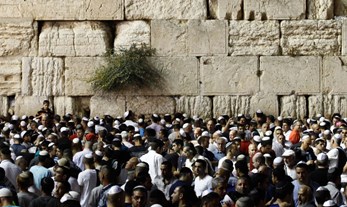
Tisha Be'av: A Social Tragedy From Then to Now
Written By: Prof. Yedidia Z. Stern
Every generation has its own barns, whose stock is the source of its national resilience. We have a supreme obligation to protect them against those who would set them afire to promote their ideology

The New Housing Plan: A Grand Plan with Fine Print
Written By:
Subsidizing cheap old apartments in poor towns won't solve the housing shortage for the ultra-Orthodox, but it will destroy those towns' social fabric

How to Generate Demand for Workers
Written By: Daphna Aviram-Nitzan
A growing number of countries around the world have realized that vocational training and subsidies for the training period can increase the demand for workers. Israel's government should follow this lead, while at the same time accelerating the pace of development of infrastructure projects, to increase the demand for skilled workers.

Two Cities Two Protests
Written By: Prof. Tamar Hermann
The Jerusalem's police force's aggressive stance, with its water cannons at the ready, play a key role in amplifying public awareness of the recent protests in the capital.

Dear American Jewish Boys: Please Find Another Outlet for your Oedipal Rage. Signed, Israeli Jews
Written By: Dr. Shany Mor
Dr. Shany Mor pens an open letter in The Forward in response to actor Seth Rogen's comments on the Israel
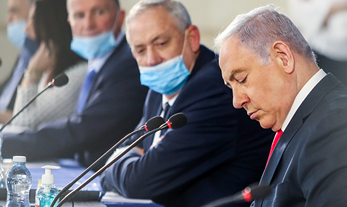
Government's Coronavirus Law is Impractical and Undemocratic
Written By: Dr. Amir Fuchs
Legislation giving ministers total authority over decision-making sets dangerous precedent for Israeli democracy and chaotic decision making will surely diminish the already-dwindling public trust in both government and future emergency regulations
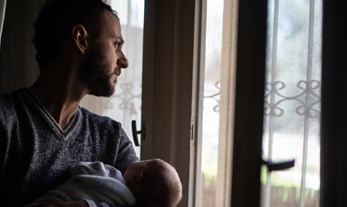
How COVID-19 Changed Fatherhood
Written By: Dr. Or Anabi
A survey by the Israel Democracy Institute found during the lockdown less than 20% of working men continued working as usual in the workplace. What does this mean for the future of work-life balance among Israeli couples?

Two Identity Cards
Written By: Prof. Yedidia Z. Stern
The government must be attuned to the will of the overwhelming majority of the people and amend the Nation State Law by adding the obligation to act in the spirit of the Declaration of Independence

The Jewish World and the Coronavirus Crisis
Written By: Dr. Shuki Friedman, Gabriel Abensour
Jewish communities around the world have been hard-hit by the coronavirus and are still struggling to deal with its implications. In an in-depth study, Dr. Shuki Friedman and Gabriel Abensour analyze how the pandemic has created challenges for halakha (Jewish law) and upended communal life and what these communities should be preparing for when this crisis finally subsides.

Is Israel's Social Protest Movement About to Emerge?
Written By: Prof. Tamar Hermann
As trust in the country's leadership erodes, the economy suffers, and the coronavirus surges, Israel is ripe to revolt, but probably won't
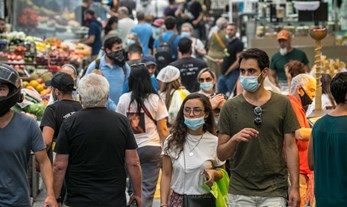
Israel in Times of Corona
Written By: Prof. Tamar Hermann, Dr. Or Anabi
A special survey, the tenth in this series, by the Guttman Center for Public Opinion and Policy Research at the Israel Democracy Institute examined public opinion about government policies relating to the coronavirus outbreak and the economic fallout from the pandemic.

The State of Tel Aviv is Founded
Written By: Dr. Shuki Friedman
Tel Aviv wants to set its own policies, regardless of what the rest of the nation desires. It will go it alone, but will still take funds from the national government.

No More Shame - No More Responsibility
Written By: Prof. Yedidia Z. Stern
Now more than ever Israel needs a leader who will bolster its inner strength - is the leadership up to the task?

Big Brother is Always Watching-Pandemic Surveillance Makes it Scarier
Written By: Dr. Tehilla Shwartz Altshuler
IDI's Dr. Tehilla Shwartz speaks with Amanda Borschel-Dan on a Times of Israel podcast about the resurgence of COVID-19 cases and how Israel's government is tracking them.
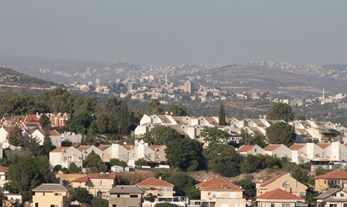
Israelis Uncertain Regarding Sovereignty in the West Bank
Written By: Prof. Tamar Hermann, Dr. Or Anabi
The Israeli Voice Index for June 2020 found that Israeli public opinion is divided over the question of whether the government should apply sovereignty in the West Bank and, if it goes forward, what such a plan should look like
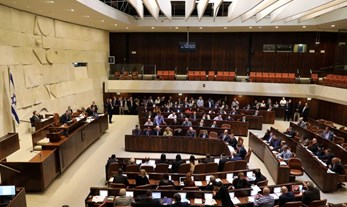
Government Unable to Manage Corona Crisis
"This fast-tracked legislation, that is intended to allow the cabinet to put further restrictions in place without approval from Knesset committees, is yet another example of chaos and an inability of the government to manage the coronavirus crisis."

Annexation and the Violation of Human Rights
Written By: Prof. Amichai Cohen, Prof. Yuval Shany
What are the possible human rights implications of annexing parts of the West Bank? In these experts from a more detailed analysis in Hebrew, IDI detail the rights that might be violated if the plan moves forward.

Applying Sovereignty - It's Complicated
Israelis Uncertain Regarding Sovereignty in the West Bank – Most Think Unlikely to be Implemented in the Next Year | As COVID-19 Numbers Rise – 60% of Israelis Fear Their Economic Future

Israel Reauthorizes Shin Bet’s Coronavirus Location Tracking
Written By: Adv. Amir Cahane
In its attempts to contain the spread of the novel coronavirus, Israel has employed a measure that has not been used by any other democratic country. Since mid-March, the Israeli government has sought the assistance of the General Security Service (also known as the Israeli Security Agency, the ISA, the Shabak or Shin Bet) in conducting epidemiological investigations by providing the Ministry of Health with the routes of coronavirus carriers and lists of individuals with whom they have been in close contact. The ISA queries its communication metadata database to identify the route of confirmed carriers and the individuals with whom they have been in close contact.
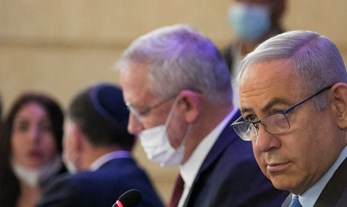
Ireland Finally Has a Government!
Written By: Prof. Ofer Kenig
A tale of two unity governments: The coalition agreement that formed Israel's unity government is all about forcing the parties to live up to the deal. Ireland's is all about policy.

Another Unnecessary War of the Jews
Written By: Dr. Shuki Friedman
Reinforcing the Rabbinate's monopoly on conversion to Judaism places unnecessary roadblocks before those who want to join the Jewish people and deepens the rift with the Diaspora

Heading Towards Annexation? IDI's Experts Hold Online Briefing for International Diplomats
IDI President Yohanan Plesner and VP of Research Prof. Yuval Shany held an online briefing for the diplomatic community in Israel focusing on potential plans by the government to apply sovereignty in parts of the West Bank.
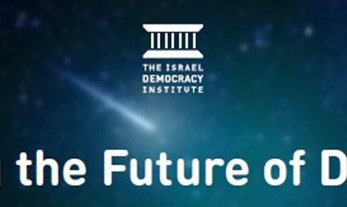
Imagining the Future of Democracy Conference
IDI and the Hebrew University held a conference on the ‘Future of Democracy’ in memory of Prof. Yaron Ezrahi featuring former Prime Minister Tony Blair and Pulitzer Prize columnist Thomas Friedman

The Slippery Slope of Rights-Restricting Temporary Measures: An Experimental Analysis
Written By: Marina Motsenok, Dr. Talya Steiner, Dr. Liat Netzer, Prof. Yuval Feldman, Prof. Raanan Sulitzeanu-Kenan
Journal: Behavioural Public Policy (Forthcoming, 2020).

Unreliable Protection: An Experimental Study of Experts’ In Bello Proportionality Decisions
Written By: Daniel Statman, Prof. Raanan Sulitzeanu-Kenan, Micha Mandel, Michael Skerker, Steven De Wijze
Journal: European Journal of International Law (Forthcoming, 2020)

IDI's Experts Hold Online Briefing Ahead of Annexation
Written By: Yohanan Plesner , Prof. Amichai Cohen
IDI experts held today an online briefing focusing on potential plans by Israel's government to apply sovereignty in areas of the West Bank as part of the U.S’ ‘Deal of the Century’

Working from Home: Pre-and Post-Coronavirus
Written By: Daphna Aviram-Nitzan, Rachel Zaken
The coronavirus has made working from home much more prevalent, and has many advantages, including improving efficiency and providing workers with more flexibility. But how do we ensure that it does not increase wage disparities and provide even more advantages to those who are already the higher earners? IDI experts weigh in with recommendations to ensure that all sides benefit

The Crisis Has Hit at the Core of the Labor Market
Written By: Daphna Aviram-Nitzan
The current crisis threatens the heart of the labor market with 400,000 workers between the ages of 35-54 designated as "temporarily absent from work" due to the coronavirus

